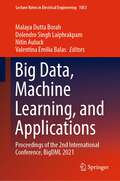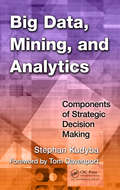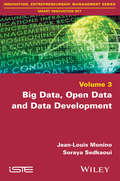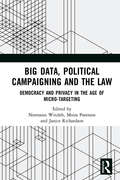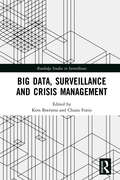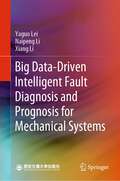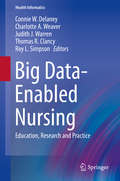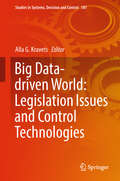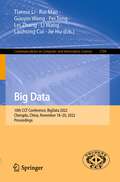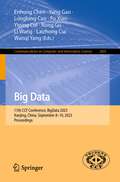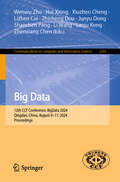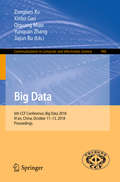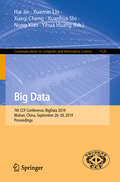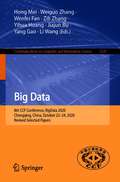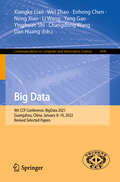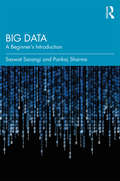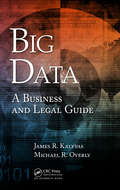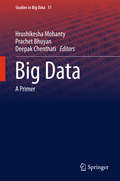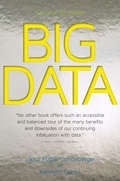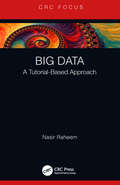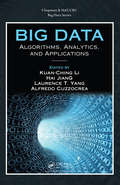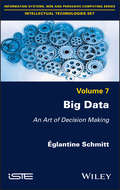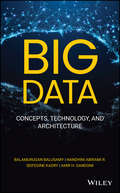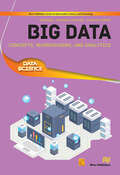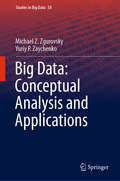- Table View
- List View
Big Data, Machine Learning, and Applications: Proceedings of the 2nd International Conference, BigDML 2021 (Lecture Notes in Electrical Engineering #1053)
by Valentina Emilia Balas Nitin Auluck Malaya Dutta Borah Dolendro Singh LaiphrakpamThis book constitutes refereed proceedings of the Second International Conference on Big Data, Machine Learning, and Applications, BigDML 2021. The volume focuses on topics such as computing methodology; machine learning; artificial intelligence; information systems; security and privacy. This volume will benefit research scholars, academicians, and industrial people who work on data storage and machine learning.
Big Data, Mining, and Analytics: Components of Strategic Decision Making
by Stephan KudybaThere is an ongoing data explosion transpiring that will make previous creations, collections, and storage of data look trivial. Big Data, Mining, and Analytics: Components of Strategic Decision Making ties together big data, data mining, and analytics to explain how readers can leverage them to extract valuable insights from their data. Facilitati
Big Data, Open Data and Data Development
by Jean-Louis Monino Soraya SedkaouiThe world has become digital and technological advances have multiplied circuits with access to data, their processing and their diffusion. New technologies have now reached a certain maturity. Data are available to everyone, anywhere on the planet. The number of Internet users in 2014 was 2.9 billion or 41% of the world population. The need for knowledge is becoming apparent in order to understand this multitude of data. We must educate, inform and train the masses. The development of related technologies, such as the advent of the Internet, social networks, "cloud-computing" (digital factories), has increased the available volumes of data. Currently, each individual creates, consumes, uses digital information: more than 3.4 million e-mails are sent worldwide every second, or 107,000 billion annually with 14,600 e-mails per year per person, but more than 70% are spam. Billions of pieces of content are shared on social networks such as Facebook, more than 2.46 million every minute. We spend more than 4.8 hours a day on the Internet using a computer, and 2.1 hours using a mobile. Data, this new ethereal manna from heaven, is produced in real time. It comes in a continuous stream from a multitude of sources which are generally heterogeneous. This accumulation of data of all types (audio, video, files, photos, etc.) generates new activities, the aim of which is to analyze this enormous mass of information. It is then necessary to adapt and try new approaches, new methods, new knowledge and new ways of working, resulting in new properties and new challenges since SEO logic must be created and implemented. At company level, this mass of data is difficult to manage. Its interpretation is primarily a challenge. This impacts those who are there to "manipulate" the mass and requires a specific infrastructure for creation, storage, processing, analysis and recovery. The biggest challenge lies in "the valuing of data" available in quantity, diversity and access speed.
Big Data, Political Campaigning and the Law: Democracy and Privacy in the Age of Micro-Targeting
by Normann Witzleb Moira Paterson Janice RichardsonIn this multidisciplinary book, experts from around the globe examine how data-driven political campaigning works, what challenges it poses for personal privacy and democracy, and how emerging practices should be regulated. The rise of big data analytics in the political process has triggered official investigations in many countries around the world, and become the subject of broad and intense debate. Political parties increasingly rely on data analytics to profile the electorate and to target specific voter groups with individualised messages based on their demographic attributes. Political micro-targeting has become a major factor in modern campaigning, because of its potential to influence opinions, to mobilise supporters and to get out votes. The book explores the legal, philosophical and political dimensions of big data analytics in the electoral process. It demonstrates that the unregulated use of big personal data for political purposes not only infringes voters’ privacy rights, but also has the potential to jeopardise the future of the democratic process, and proposes reforms to address the key regulatory and ethical questions arising from the mining, use and storage of massive amounts of voter data. Providing an interdisciplinary assessment of the use and regulation of big data in the political process, this book will appeal to scholars from law, political science, political philosophy and media studies, policy makers and anyone who cares about democracy in the age of data-driven political campaigning.
Big Data, Surveillance and Crisis Management (Routledge Studies in Surveillance)
by Kees Boersma and Chiara FonioBig data, surveillance, crisis management. Three largely different and richly researched fields, however, the interplay amongst these three domains is rarely addressed. Through unique international case studies this book examines the links between these three fields. Considering crisis management as an 'umbrella term' that covers a number of crises and ways of managing them, this book explores the collection of ‘big data’ by governmental crisis organisations, as well as the unintended consequences of using such data. In particular, through the lens of surveillance, the contributions investigate how the use and abuse of big data can easily lead to monitoring and controlling the behaviour of people affected by crises. Readers will understand that big data in crisis management must be examined as a political process, involving questions of power and transparency. A highly topical volume, Big Data, Surveillance and Crisis Management will appeal to postgraduate students and postdoctoral researchers interested in fields including Sociology and Surveillance Studies, Disaster and Crisis Management, Media Studies, Governmentality, Organisation Theory and Information Society Studies.
Big Data-Driven Intelligent Fault Diagnosis and Prognosis for Mechanical Systems
by Xiang Li Yaguo Lei Naipeng LiThis book presents systematic overviews and bright insights into big data-driven intelligent fault diagnosis and prognosis for mechanical systems. The recent research results on deep transfer learning-based fault diagnosis, data-model fusion remaining useful life (RUL) prediction, etc., are focused on in the book. The contents are valuable and interesting to attract academic researchers, practitioners, and students in the field of prognostics and health management (PHM). Essential guidelines are provided for readers to understand, explore, and implement the presented methodologies, which promote further development of PHM in the big data era. Features: Addresses the critical challenges in the field of PHM at presentPresents both fundamental and cutting-edge research theories on intelligent fault diagnosis and prognosisProvides abundant experimental validations and engineering cases of the presented methodologies
Big Data-Enabled Nursing: Education, Research and Practice (Health Informatics)
by Charlotte A. Weaver Connie W. Delaney Judith J. Warren Thomas R. Clancy Roy L. SimpsonHistorically, nursing, in all of its missions of research/scholarship, education and practice, has not had access to large patient databases. Nursing consequently adopted qualitative methodologies with small sample sizes, clinical trials and lab research. Historically, large data methods were limited to traditional biostatical analyses. In the United States, large payer data has been amassed and structures/organizations have been created to welcome scientists to explore these large data to advance knowledge discovery. Health systems electronic health records (EHRs) have now matured to generate massive databases with longitudinal trending. This text reflects how the learning health system infrastructure is maturing, and being advanced by health information exchanges (HIEs) with multiple organizations blending their data, or enabling distributed computing. It educates the readers on the evolution of knowledge discovery methods that span qualitative as well as quantitative data mining, including the expanse of data visualization capacities, are enabling sophisticated discovery. New opportunities for nursing and call for new skills in research methodologies are being further enabled by new partnerships spanning all sectors.
Big Data-driven World: Legislation Issues and Control Technologies (Studies in Systems, Decision and Control #181)
by Alla G. KravetsThis book examines the methodological foundations of the Big Data-driven world, formulates its concept within the frameworks of modern control methods and theories, and approaches the peculiarities of Control Technologies as a specific sphere of the Big Data-driven world, distinguished in the modern Digital Economy. The book studies the genesis of mathematical and information methods’ transition from data analysis & processing to knowledge discovery and predictive analytics in the 21st century. In addition, it analyzes the conditions of development and implementation of Big Data analysis approaches in investigative activities and determines the role and meaning of global networks as platforms for the establishment of legislation and regulations in the Big Data-driven world.The book examines that world through the prism of Legislation Issues, substantiate the scientific and methodological approaches to studying modern mechanisms of terrorism and extremism counteraction in the conditions of new challenges of dissemination and accessibility of socially dangerous information. Systematization of successful experience of the Big Data solutions implementation in the different countries and analyze causal connections of the Digital Economy formation from the positions of new technological challenges is performed.The book’s target audience includes scientists, students, PhD and Master students who conduct scientific research on the topic of Big Data not only in the field of IT& data science, but also in connection with legislative regulation aspects of the modern information society. It also includes practitioners and experts, as well as state authorities and representatives of international organizations interested in creating mechanisms for implementing Digital Economy projects in the Big Data-driven world.
Big Data: 10th CCF Conference, BigData 2022, Chengdu, China, November 18–20, 2022, Proceedings (Communications in Computer and Information Science #1709)
by Lei Zhang Li Wang Tianrui Li Guoyin Wang Jie Hu Rui Mao Laizhong Cui Fei TengThis book constitutes the refereed proceedings of the 10th CCF Conference on BigData 2022, which took place in Chengdu, China, in November 2022. The 8 full papers presented in this volume were carefully reviewed and selected from 28 submissions. The topics of accepted papers include theories and methods of data science, algorithms and applications of big data.
Big Data: 11th CCF Conference, BigData 2023, Nanjing, China, September 8–10, 2023, Proceedings (Communications in Computer and Information Science #2005)
by Longbing Cao Li Wang Yang Gao Fu Xiao Laizhong Cui Enhong Chen Yiping Cui Rong Gu Wanqi YangThis book constitutes the refereed proceedings of the 11th CCF Conference on BigData 2023, which took place in Nanjing, China, in September 2023. The 14 full papers presented in this volume were carefully reviewed and selected from 69 submissions. The topics of accepted papers include theories and methods of data science, algorithms and applications of big data.
Big Data: 12th CCF Conference, BigData 2024, Qingdao, China, August 9–11, 2024, Proceedings (Communications in Computer and Information Science #2301)
by Hui Xiong Li Wang Wenwu Zhu Zhicheng Dou Xiuzhen Cheng Zhenxiang Chen Lizhen Cui Junyu Dong Shanchen Pang Lanju Kong“This book constitutes the refereed proceedings of the 12th CCF Conference on BigData 2024, which took place in Qingdao, China, in August 2024” to “This book constitutes the refereed proceedings of the 12th CCF Conference on BigData 2024, which took place in Qingdao, China, during 9-11 August, 2024. The 26 full papers presented in this volume were carefully reviewed and selected from 219 submissions. The topics of accepted papers include Big data, Data Science, System Architecture and Infrastructure, Storage Management, Parallel Computing, Analysis Mining and Intelligent Computing, Collection and Preprocessing, Governance.
Big Data: 6th CCF Conference, Big Data 2018, Xi'an, China, October 11-13, 2018, Proceedings (Communications in Computer and Information Science #945)
by Xinbo Gao Qiguang Miao Zongben Xu Yunquan Zhang Jiajun BuThis volume constitutes the proceedings of the 6th CCF Conference, Big Data 2018, held in Xi'an, China, in October 2018. The 32 revised full papers presented in this volume were carefully reviewed and selected from 880 submissions. The papers are organized in topical sections on natural language processing and text mining; big data analytics and smart computing; big data applications; the application of big data in machine learning; social networks and recommendation systems; parallel computing and storage of big data; data quality control and data governance; big data system and management.
Big Data: 7th CCF Conference, BigData 2019, Wuhan, China, September 26–28, 2019, Proceedings (Communications in Computer and Information Science #1120)
by Hai Jin Xuemin Lin Xuanhua Shi Xueqi Cheng Nong Xiao Yihua HuangThis book constitutes the proceedings of the 7th CCF Conference on Big Data, BigData 2019, held in Wuhan, China, in October 2019.The 30 full papers presented in this volume were carefully reviewed and selected from 324 submissions. They were organized in topical sections as follows: big data modelling and methodology; big data support and architecture; big data processing; big data analysis; and big data application.
Big Data: 8th CCF Conference, BigData 2020, Chongqing, China, October 22–24, 2020, Revised Selected Papers (Communications in Computer and Information Science #1320)
by Li Wang Yang Gao Zili Zhang Hong Mei Jiajun Bu Yihua Huang Weiguo Zhang Wenfei FanThis book constitutes the proceedings of the 8th CCF Conference on Big Data, BigData 2020, held in Chongqing, China, in October 2020.The 16 full papers presented in this volume were carefully reviewed and selected from 65 submissions. They present recent research on theoretical and technical aspects on big data, as well as on digital economy demands in big data applications.
Big Data: 9th CCF Conference, BigData 2021, Guangzhou, China, January 8–10, 2022, Revised Selected Papers (Communications in Computer and Information Science #1496)
by Li Wang Yang Gao Wei Zhao Yinghuan Shi Nong Xiao Dan Huang Xiangke Liao Enhong Chen Changdong WangThis book constitutes the proceedings of the 9th CCF Conference on Big Data, BigData 2021, held in Guangzhou, China, in January 2022. Due to the COVID-19 pandemic BigData 2021 was postponed to 2022. The 21 full papers presented in this volume were carefully reviewed and selected from 66 submissions. They present recent research on theoretical and technical aspects on big data, as well as on digital economy demands in big data applications.
Big Data: A Beginner's Introduction
by Pankaj Sharma Saswat SarangiBig Data is everywhere. It shapes our lives in more ways than we know and understand. This comprehensive introduction unravels the complex terabytes that will continue to shape our lives in ways imagined and unimagined. Drawing on case studies like Amazon, Facebook, the FIFA World Cup and the Aadhaar scheme, this book looks at how Big Data is changing the way we behave, consume and respond to situations in the digital age. It looks at how Big Data has the potential to transform disaster management and healthcare, as well as prove to be authoritarian and exploitative in the wrong hands. The latest offering from the authors of Artificial Intelligence: Evolution, Ethics and Public Policy, this accessibly written volume is essential for the researcher in science and technology studies, media and culture studies, public policy and digital humanities, as well as being a beacon for the general reader to make sense of the digital age.
Big Data: A Business and Legal Guide
by James R. Kalyvas Michael R. OverlyBig Data: A Business and Legal Guide supplies a clear understanding of the interrelationships between Big Data, the new business insights it reveals, and the laws, regulations, and contracting practices that impact the use of the insights and the data. Providing business executives and lawyers (in-house and in private practice) with an accessible p
Big Data: A Primer (Studies in Big Data #11)
by Hrushikesha Mohanty Prachet Bhuyan Deepak ChenthatiThis book is a collection of chapters written by experts on various aspects of big data. The book aims to explain what big data is and how it is stored and used. The book starts from the fundamentals and builds up from there. It is intended to serve as a review of the state-of-the-practice in the field of big data handling. The traditional framework of relational databases can no longer provide appropriate solutions for handling big data and making it available and useful to users scattered around the globe. The study of big data covers a wide range of issues including management of heterogeneous data, big data frameworks, change management, finding patterns in data usage and evolution, data as a service, service-generated data, service management, privacy and security. All of these aspects are touched upon in this book. It also discusses big data applications in different domains. The book will prove useful to students, researchers, and practicing database and networking engineers.
Big Data: A Revolution That Will Transform How We Live, Work, and Think
by Viktor Mayer-Schönberger Kenneth Cukier<P>A revelatory exploration of the hottest trend in technology and the dramatic impact it will have on the economy, science, and society at large.Which paint color is most likely to tell you that a used car is in good shape? How can officials identify the most dangerous New York City manholes before they explode? And how did Google searches predict the spread of the H1N1 flu outbreak? The key to answering these questions, and many more, is big data. <P> “Big data” refers to our burgeoning ability to crunch vast collections of information, analyze it instantly, and draw sometimes profoundly surprising conclusions from it. This emerging science can translate myriad phenomena—from the price of airline tickets to the text of millions of books—into searchable form, and uses our increasing computing power to unearth epiphanies that we never could have seen before. <P> A revolution on par with the Internet or perhaps even the printing press, big data will change the way we think about business, health, politics, education, and innovation in the years to come. It also poses fresh threats, from the inevitable end of privacy as we know it to the prospect of being penalized for things we haven’t even done yet, based on big data’s ability to predict our future behavior.In this brilliantly clear, often surprising work, two leading experts explain what big data is, how it will change our lives, and what we can do to protect ourselves from its hazards. Big Data is the first big book about the next big thing.
Big Data: A Tutorial-Based Approach
by Nasir RaheemBig Data: A Tutorial-Based Approach explores the tools and techniques used to bring about the marriage of structured and unstructured data. It focuses on Hadoop Distributed Storage and MapReduce Processing by implementing (i) Tools and Techniques of Hadoop Eco System, (ii) Hadoop Distributed File System Infrastructure, and (iii) efficient MapReduce processing. The book includes Use Cases and Tutorials to provide an integrated approach that answers the ‘What’, ‘How’, and ‘Why’ of Big Data. Features Identifies the primary drivers of Big Data Walks readers through the theory, methods and technology of Big Data Explains how to handle the 4 V’s of Big Data in order to extract value for better business decision making Shows how and why data connectors are critical and necessary for Agile text analytics Includes in-depth tutorials to perform necessary set-ups, installation, configuration and execution of important tasks Explains the command line as well as GUI interface to a powerful data exchange tool between Hadoop and legacy r-dbms databases
Big Data: Algorithms, Analytics, and Applications (Chapman And Hall/crc Big Data Ser.)
by Hai Jiang Alfredo Cuzzocrea Laurence T. Yang Kuan-Ching LiAs today's organizations are capturing exponentially larger amounts of data than ever, now is the time for organizations to rethink how they digest that data. Through advanced algorithms and analytics techniques, organizations can harness this data, discover hidden patterns, and use the newly acquired knowledge to achieve competitive advantages.Pre
Big Data: An Art of Decision Making
by Eglantine SchmittManipulating and processing masses of digital data is never a purely technical activity. It requires an interpretative and exploratory outlook – already well known in the social sciences and the humanities – to convey intelligible results from data analysis algorithms and create new knowledge. Big Data is based on an inquiry of several years within Proxem, a software publisher specializing in big data processing. The book examines how data scientists explore, interpret and visualize our digital traces to make sense of them, and to produce new knowledge. Grounded in epistemology and science and technology studies, Big Data offers a reflection on data in general, and on how they help us to better understand reality and decide on our daily actions.
Big Data: Concepts, Technology, and Architecture
by Amir H. Gandomi Seifedine Kadry Balamurugan Balusamy Nandhini Abirami RLearn Big Data from the ground up with this complete and up-to-date resource from leaders in the field Big Data: Concepts, Technology, and Architecture delivers a comprehensive treatment of Big Data tools, terminology, and technology perfectly suited to a wide range of business professionals, academic researchers, and students. Beginning with a fulsome overview of what we mean when we say, “Big Data,” the book moves on to discuss every stage of the lifecycle of Big Data. You’ll learn about the creation of structured, unstructured, and semi-structured data, data storage solutions, traditional database solutions like SQL, data processing, data analytics, machine learning, and data mining. You’ll also discover how specific technologies like Apache Hadoop, SQOOP, and Flume work. Big Data also covers the central topic of big data visualization with Tableau, and you’ll learn how to create scatter plots, histograms, bar, line, and pie charts with that software. Accessibly organized, Big Data includes illuminating case studies throughout the material, showing you how the included concepts have been applied in real-world settings. Some of those concepts include: The common challenges facing big data technology and technologists, like data heterogeneity and incompleteness, data volume and velocity, storage limitations, and privacy concerns Relational and non-relational databases, like RDBMS, NoSQL, and NewSQL databases Virtualizing Big Data through encapsulation, partitioning, and isolating, as well as big data server virtualization Apache software, including Hadoop, Cassandra, Avro, Pig, Mahout, Oozie, and Hive The Big Data analytics lifecycle, including business case evaluation, data preparation, extraction, transformation, analysis, and visualization Perfect for data scientists, data engineers, and database managers, Big Data also belongs on the bookshelves of business intelligence analysts who are required to make decisions based on large volumes of information. Executives and managers who lead teams responsible for keeping or understanding large datasets will also benefit from this book.
Big Data: Concepts, Warehousing, and Analytics
by Carlos Costa Maribel Yasmina SantosBig Data is a concept of major relevance in today’s world, sometimes highlighted as a key asset for productivity growth, innovation, and customer relationship, whose popularity has increased considerably during the last years. Areas like smart cities, manufacturing, retail, finance, software development, environment, digital media, among others, can benefit from the collection, storage, processing, and analysis of Big Data, leveraging unprecedented data-driven workflows and considerably improved decision-making processes.The concept of a Big Data Warehouse (BDW) is emerging as either an augmentation or a replacement of the traditional Data Warehouse (DW), a concept that has a long history as one of the most valuable enterprise data assets. Nevertheless, research in Big Data Warehousing is still in its infancy, lacking an integrated and validated approach for designing and implementing both the logical layer (data models, data flows, and interoperability between components) and the physical layer (technological infrastructure) of these complex systems. This book addresses models and methods for designing and implementing Big Data Systems to support mixed and complex decision processes, giving special attention to BDWs as a way of efficiently storing and processing batch or streaming data for structured or semi-structured analytical problems.
Big Data: Conceptual Analysis and Applications (Studies in Big Data #58)
by Yuriy P. Zaychenko Michael Z. ZgurovskyThe book is devoted to the analysis of big data in order to extract from these data hidden patterns necessary for making decisions about the rational behavior of complex systems with the different nature that generate this data. To solve these problems, a group of new methods and tools is used, based on the self-organization of computational processes, the use of crisp and fuzzy cluster analysis methods, hybrid neural-fuzzy networks, and others. The book solves various practical problems. In particular, for the tasks of 3D image recognition and automatic speech recognition large-scale neural networks with applications for Deep Learning systems were used. Application of hybrid neuro-fuzzy networks for analyzing stock markets was presented. The analysis of big historical, economic and physical data revealed the hidden Fibonacci pattern about the course of systemic world conflicts and their connection with the Kondratieff big economic cycles and the Schwabe–Wolf solar activity cycles. The book is useful for system analysts and practitioners working with complex systems in various spheres of human activity.
